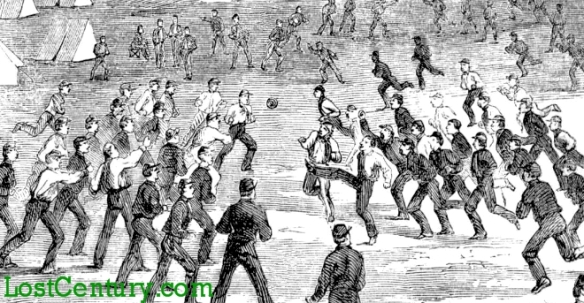October 18, 1852, Monday – The New-York Times
YALE FOOT BALL GAME
In almost every University in America there is some contest to decide the strength and agility of the Freshman and Sophomore classes. In Yale, it is the Foot-ball Game.
On Wednesday, 13th inst., at 4 o’clock, P.M., the rival classes met for the purpose of contesting five games. Each class numbers 114 youths; and this year, their apparent strength was so nearly equal, that it was generally conceded that if the Sophomores conquered, as is usually the result, it would be through artifice.
The Freshmen gave the first kick, and then a general rush was made for the ball, around which they formed a dense crowd for 15 minutes, each class striving to their utmost ability without gaining a single rod. At this crisis the ball was kicked from the crowd, over the side bounds, where any one who could get it has the right to one kick. A Sophomore obtained this right, but, not being expert himself, he communicated the ball to the leader of his class, a powerful fellow, who ran several rods with it, when he was overtaken by a more athletic Freshman, but succeeded in throwing the ball nearly over the goal. One or two more kicks, and the umpires decided that the Sophomores had won the first game.
After contesting the second game for nearly an hour, the umpires finally decided that one of the Freshmen, having caught the ball, was entitled to a kick at it. This the Sophomores were unwilling to allow, but claimed a victory, and challenged the Freshmen to commence the third game. The Freshmen determined to abide by the decision of the umpires, and refused to commence the third game until their second was fairly (as they claimed) ended.
It is but justice to the Sophomores to say that one of the umpires decided the second game in their favor. Darkness here ended the fierce conflict.
The Freshmen have since challenged their rivals to play the remaining four games. But the Sophomores are determined not to play again unless the Freshmen will commence at the third. Here the matter will probably rest, as neither party is disposed to compromise.
Hundreds of spectators witnessed this trial of strength, in which the combatants manifested as much interest and invincible courage as was ever exercised upon the plains of Mexico by the American soldiers; and it is also worthy of note that in this contest also, one brave hero fainted, and was borne bleeding from the field.





